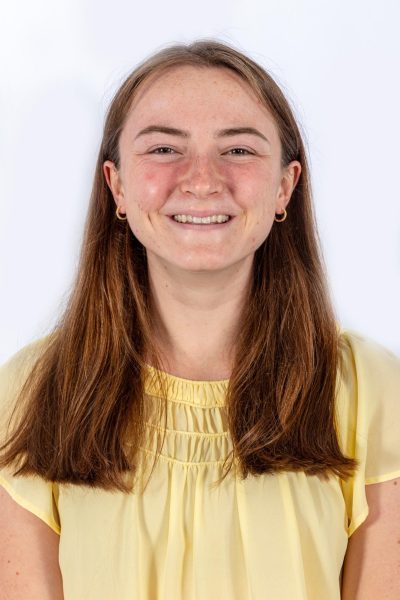The Ithaca College Board of Trustees held an open conversation Oct. 10 to recap its Fall 2025 meetings and answer questions from students, faculty and staff about progress toward reducing the college’s budget deficit, artificial intelligence and uncertainty in higher education.
The board’s Fall 2025 meetings ran from Oct. 8 through Oct. 10 on campus. John Neeson ’84, chair of the board of trustees, and Chris Palmieri ’96, vice chair of the board of trustees, summarized the board’s meetings and events for about 25 people who attended the open conversation.
In addition to checking in on the college’s financial operations, Neeson said board members discussed the college’s approach to artificial intelligence with David Weil, senior vice president for Strategic Services and Initiatives. Trustees also visited the School of Music, Theatre, and Dance, trained new members and had dinner with past board members.
Narges Kasiri, professor in the Department of Management, asked if the board made any significant decisions during the meetings.
Neeson said these meetings were more of a check on the college’s progress toward eliminating the budget deficit by Fiscal Year 2028.
The board asked President La Jerne Cornish in 2024 to close the deficit within the following three fiscal years. With guidance from the Huron Consulting Group and Hanover Research, college administrators have been working to close the deficit through decreasing expenses, increasing revenue and establishing a sustainable enrollment target to make more accurate budget projections.
“We see the school as being on that plan [to reduce the deficit], being managed effectively,” Neeson said. “We spent some time in advancement, looking at … what else the college is going to need, and how will we look to fund those efforts, and how philanthropy essentially will provide that. … We spent a fair amount of time looking at … capital requirements, and also thinking about the future — what we’re going to need to be able to provide that.”
A faculty member who declined to share their name with The Ithacan asked Neeson and Palmieri how they would respond to employees who have seen stagnant wages and decreasing resources and position lines.
“What do you say to the employees and the community here on campus … who’ve been here a long time, and know what incredible resources we used to have, and are really aware of how tight things are now?” the faculty member said.
Neeson said the college must currently focus on improving productivity and stabilizing its finances.
“Like any institution, like any business, there’s periods in which there is a right sizing,” Neeson said. “Market dynamics have changed. We’ve made adjustments. … So I first of all say to everybody that you’ve done great work, and we appreciate the great work … We gave the president, let’s get three years, let’s get down to break even. Conversation changes after that to ‘Where are we going to invest?’ So that’s the part where we want to get to, which I think you’re kind of pointing to.”
Neeson said the board felt comfortable with the strategies for enrollment, philanthropy, marketing and financial management that college administrators shared during the meetings.
Palmieri and Neeson said the board therefore spent more time discussing how to prepare the college to attract future students and ensure long-term sustainability. They said the board analyzed some areas on campus that need capital investment, like the dorms and Emerson Suites. Neeson said renovating Emerson Suites could allow the college to host more outside events, which could generate more revenue.
“I want to see Ithaca Forever, and believe in the strategy and everything that’s underpinning it, and I feel really confident that we’re going to hit all the targets,” Palmieri said. “We leave campus today and feel really inspired about Ithaca College.”
John Barr, professor in the Department of Computer Science, said he has heard from college administrators that the board is concerned about AI’s impact on IC and academia in general. He asked whether the trustees think the college is adequately addressing AI.
Neeson said that based on what he has seen from teaching as an adjunct professor at other colleges, Ithaca College’s AI strategy is more advanced than many higher education institutions.
“The worry is not negative,” Neeson said. “The worry is, ‘How are we going to take advantage of it? How are we going to allow people to be more productive? How are we going to allow these students’ experiences in their education, to be part of it?’ Because it’s here, it’s not going away.”
Jennifer Jolly — Dana Professor in the Department of Art, Art History, and Architecture — said she understood that the college is not heavily reliant on grant funding and might not be as affected by federal funding cuts as other institutions. However, she said, she wondered whether the board discussed how to navigate the current insecurity in higher education.
Neeson said the board extensively discussed uncertainty in higher education, including with experts from legal firms and the consulting firm EAB. He said many of the changes impacting institutions are still unclear, especially with pending lawsuits.
“While I say that, gee, we’re not a research institution … we’re definitely affected,” Neeson said. “It’s unfortunate. … From a governance standpoint, we have to feel comfortable that, does the college have plans in place to navigate it, which we do.”















